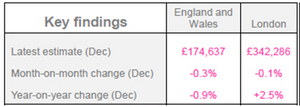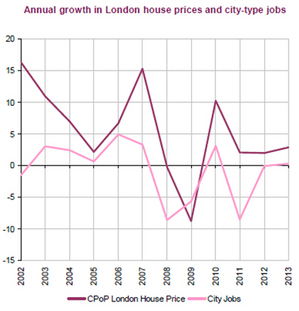The WPJ
THE WORLD PROPERTY JOURNALReal Estate Facts Not Fiction
Residential Real Estate News

London Home Prices Under Pressure From Weak Employment, Eurozone Debt Crisis
Residential News » Europe Residential News Edition | By Michael Gerrity | January 11, 2012 8:15 AM ET
 According to Chesterton Humberts/CEBR DECMBER 2011 House Price Poll of Polls, London house prices throughout most of the year, have been insulated from the effects of the recession and public sector job losses.
According to Chesterton Humberts/CEBR DECMBER 2011 House Price Poll of Polls, London house prices throughout most of the year, have been insulated from the effects of the recession and public sector job losses.However, potential buyers have become concerned about the Eurozone sovereign debt crisis in recent months, which has started to negatively affect the capital's house prices. According to the Chesterton Humberts Poll of Polls, London house prices have fallen by 1.0% in the fourth quarter of 2011 compared to the previous quarter. This puts the current London house price average at £342,286 in December, which is around 2.5% higher than the same month last year.
Annual price growth in London has slowed to 2.5% in 2011 after rebounding by 10.3% in 2010. This 'below-trend' growth in house prices is partly explained by a net loss of 26,800 city jobs in 2011 - representing a 8.5% annual fall in city employment.
Lower numbers of city jobs ultimately means lower demand for house prices - and at the same time bankers' bonuses (which are traditionally invested in property) have fallen by £0.5 billion (from £7.3 billion in 2010/11).
Report Highlights:
- London house prices have fallen by 1% in Q4 2011 compared to Q3 2011, or £3,130 in monetary terms.
- London house prices have finished the year up 2.1% in 2011 compared to 2010 as a whole. This compares to prices in the UK falling by 1.4% as a whole.
- The level of city-type jobs employment is a lead indicator of London house price growth. City job employment fell year-on-year by 8.5% in 2011.
Chesterton Humberts' CEO Robert Bartlett tells World Property Channel, "The possibility of a 'Eurogeddon' continues to impact the prime central London market. We are seeing an influx of Eurozone buyers seeking steady yields and low volatility but there is very little stock available. Many are investors seeking buy-to-let properties in the £500,000 to £2.5mn range which will rent to professional and corporate couples and families or high net worth students.
 "However, properties in prime areas that are owned by international investors tend to be held for the long term and they currently have no incentive to sell, even to upgrade, so little is coming onto the market.
"However, properties in prime areas that are owned by international investors tend to be held for the long term and they currently have no incentive to sell, even to upgrade, so little is coming onto the market."The lack of transactions is likely to be the one factor that ensures some growth in the London market in 2012. Demand is still fuelled by the number of international investors who continue to regard London as the safe-haven of choice. The lack of stock is causing asking prices to rise as agents attempt to outbid each other to win instructions. The danger, of course, is that vendors become unrealistic in their expectations and market stagnation follows which is exactly the situation within the Country House market."
A stagnant mortgage market and weak economic growth in the economy have kept a lid on house price growth throughout 2011. The total level of mortgage approvals from January to November 2011 equalled 544,072 - 2.1% lower than the same period a year earlier.
Year-on-year, house prices have fallen by 0.9% in December, which is still marginally better than the 1.2% fall reported in the previous month. This is owing to better economic conditions in December 2011 compared to the same month last year - when freezing conditions gripped the UK and stalled growth.
December's better than expected services sector performance suggests that the UK will narrowly avoid contraction in Q3 2011. Furthermore, falling consumer price inflation since September 2011 has also relieved the squeeze on real disposable incomes, increasing mortgage affordability and supporting demand.
Despite conditions improving in the short term, the housing market remains in a state of fragility. Furthermore, house prices are falling month-on-month across all regions including London, where reduced bankers bonuses and weak financial services activity has stymied house price growth.
CEBR's Douglas McWilliams commented, "This month's Chesterton Humberts Poll of Polls shows that while London may have some buffer against the public sector spending cuts, it is by no means insulated from the Eurozone sovereign debt crisis across the channel. Our research shows house prices in the capital are experiencing a sticky patch at the moment as both City bonuses and jobs are on a downward trend. This is likely to impact confidence in the market, although London house prices are still slightly higher than last year when adverse and snowy weather derailed economic growth."
Sign Up Free | The WPJ Weekly Newsletter
Relevant real estate news.
Actionable market intelligence.
Right to your inbox every week.
Real Estate Listings Showcase
Related News Stories
Residential Real Estate Headlines
- More Americans Opting for Renting Over Homeownership in 2024
- BLOCKTITLE Global Property Tokenization Platform Announced
- Small Investors Quietly Reshaping the U.S. Housing Market in Late 2024
- Greater Miami Overall Residential Sales Dip 9 Percent in November
- U.S. Home Sales Enjoy Largest Annual Increase in 3 Years Post Presidential Election
- U.S. Housing Industry Reacts to the Federal Reserve's Late 2024 Rate Cut
- U.S. Home Builders Express Optimism for 2025
- Older Americans More Likely to Buy Disaster-Prone Homes
- NAR's 10 Top U.S. Housing Markets for 2025 Revealed
- U.S. Mortgage Delinquencies Continue to Rise in September
- U.S. Mortgage Rates Tick Down in Early December
- Post Trump Election, U.S. Homebuyer Sentiment Hits 3-Year High in November
- Global Listings Aims to Become the Future 'Amazon of Real Estate' Shopping Platform
- Greater Las Vegas Home Sales Jump 15 Percent in November
- Ultra Luxury Home Sales Globally Experience Slowdown in Q3
- World Property Exchange Announces Development Plan
- Hong Kong Housing Market to Reach Equilibrium in Late 2025
- Construction Job Openings in U.S. Down 40 Percent Annually in October
- U.S. Mortgage Applications Increase in Late October
- World Property Markets, World Property Media to Commence Industry Joint-Venture Funding Rounds in 2025
- New Home Sales Hit 2 Year Low in America
- U.S. Pending Home Sales Increase for Third Consecutive Month in October
- Pandemic-led Residential Rent Boom is Now Fizzling in the U.S.
- Emerging Global Real Estate Streamer WPC TV Expands Video Programming Lineup
- 1 in 5 Renters in America Entire Paycheck Used to Pay Monthly Rent in 2024
- U.S. Home Sales Jump 3.4 Percent in October
- Home Buyers Negotiation Power Grows Amid Cooling U.S. Market
- Canadian Home Sales Surge in October, Reaching a Two-Year High
- Greater Orlando Area Home Sales Continue to Slide in October
- U.S. Mortgage Credit Availability Increased in October
- U.S. Mortgage Rates Remain Stubbornly High Post Election, Rate Cuts
- Construction Input Prices Continue to Rise in October
- BETTER MLS: A New Agent and Broker Owned National Listings Platform Announced
- Home Prices Rise in 87 Percent of U.S. Metros in Q3
- Caribbean Islands Enjoying a New Era of Luxury Property Developments
- The World's First 'Global Listings Service' Announced
- Agent Commission Rates Continue to Slip Post NAR Settlement
- Market Share of First Time Home Buyers Hit Historic Low in U.S.
- Greater Palm Beach Area Residential Sales Drop 20 Percent Annually in September
- Mortgage Applications in U.S. Dip in Late October
Reader Poll
Marketplace Links
This website uses cookies to improve user experience. By using our website you consent in accordance with our Cookie Policy. Read More





